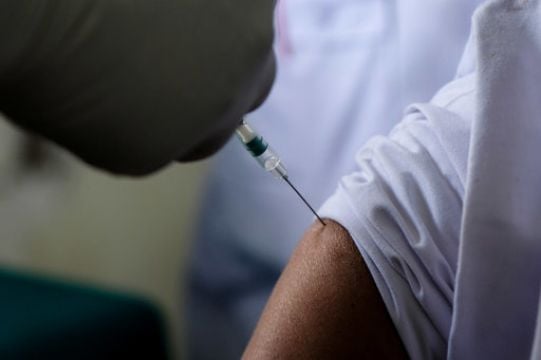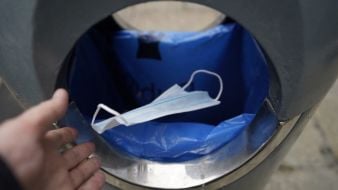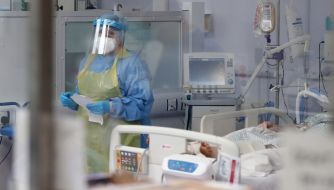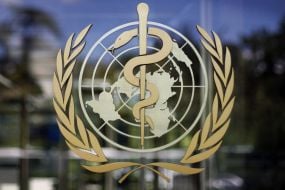The roll-out of Covid vaccines across the world is starting to ramp up and frontline healthcare workers and nursing home residents in Ireland are currently receiving their jabs.
While most people can't wait to get vaccinated, others still have safety questions.
The vaccines from Pfizer/BioNTech and Moderna are both based on mRNA technology.
Dr Piotr Kowalski is an Emerging Investigator for Health and a special lecturer in advanced therapies at University College Cork's School of Pharmacy, as well as the inventor of two patents on RNA delivery technologies.
Dr Kowalski spoke to BreakingNews.ie about the safety and efficacy of Covid vaccines, debunking some of the common safety concerns people may have.
Does mRNA alter DNA?
The simple answer is no.
Dr Kowalski explains: “RNA and DNA are very different molecules in terms of chemical composition. There is no way that RNA can integrate into our genomic DNA. They are in two distinct compartments if you like, RNA that is delivered by vaccines usually wants to stay in the cytoplasmic compartment of the cell, whereas DNA is located in another compartment within the cell which is called the nucleus.
“For those two molecules there is a barrier that separates them physically. Not only because of their composition and structure, they do not combine, they cannot combine, they are also separated by this nuclear barrier.”
He added: “Put simply, mRNA vaccines cannot alter our DNA, the only thing that they do is express one particular protein of the virus, they do not produce a complete virus, it's one specific protein, in this case the spike protein of the coronavirus. It's really safe in that sense.
“RNA does not have any ability to alter our cells, it just turns them into a factory to produce this one particular viral protein.”
Should we be concerned at the speed of the development of Covid vaccines?
Covid vaccines have been developed at unprecedented speed but this is down to the scientific developments available and Dr Kowalski insists “no corners have been cut in terms of development speed”.
“There were a lot of resources put into producing a vaccine as fast as possible, this enabled faster development,” he explained.
“The regulatory process, the clinical trial process, they were sped up but there was no compromise in terms of rigorous design of the clinical trials. There was a huge number of patients in every phase. For mRNA vaccines, there were 30-40,000 people in each of the clinical trials, from all over the world. There was no compromise.”
He explained that developments already made in mRNA technology allowed for the vaccines to be produced quickly.
“mRNA technology and the delivery technology have been well-developed and investigated. That's what enabled the mRNA vaccines to move faster.
“It enables a faster development speed as it doesn't require a cell based process to develop the vaccines.
“The research on mRNA technology has been going on for a while, there are also a couple of vaccines that have already been in development in clinical trials based on mRNA technology, one was for HIV and there has also been research into cancer vaccines.”
He explained that the AstraZeneca vaccine also benefited from research that had already been conducted.
“Similarly, AstraZeneca benefited from the research that has beeen done on SARS and MERS, there has also been previous work on coronaviruses. These vaccines benefited in producing the target protein we needed to train our immune system.”
Safety of chimpanzee adenovirus vectors
The AstraZeneca vaccine is a chimpanzee adenovirus vaccine vector. Some have raised questions over its safety but Dr Kowalski explains why there is no need for this to be a concern.
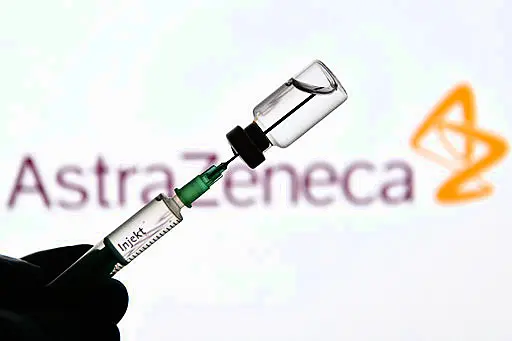
“The AstraZeneca vaccine is a vector based vaccine. Adenovirus vaccine vectors have been used for a while in gene therapy, this technology is established, it uses DNA instead of RNA.
“Adenovirus vector is a common cold virus that causes colds in chimpanzees, AstraZeneca chose this virus because a virus that produced sickness in humans would mean a higher chance that we would already be immune to this vector which would lower the efficacy of this vaccine.
“The use of adenovirus vector is not a reason for concern, in fact it's an advantage.”
Will the new strains of coronavirus affect vaccine efficacy?
Companies are currently investigating whether the new strains of Covid-19, first detected in the UK and South Africa, will have an impact on the efficacy of their vaccines.
Pfizer/BioNTech said initial research suggested their vaccine would not be affected.
Dr Kowalski said this was no reason to worry people, adding that there was no evidence to suggest the efficacy of vaccines would be affected.
He said that there was a possibility mutations could have an impact, although there is no evidence yet and the vaccines could be altered in that scenario.
“If those mutations accumulate, there would be a chance that the virus could break out if the protein changes enough to make the recognition of the antibodies not as effective.
“Therefore, it is super important for people to continue to follow the guidelines after being vaccinated and to limit the spread of the virus.
“I don't think there are any concerns about the efficacy of vaccines. Even if it were to happen, a new vaccine could be quickly developed that would be able to target the mutated version of the protein.
“Obviously that would put us a couple of months behind, but it is relatively easy to modify mRNA vaccines because the sequence would need to be changed, the rest of the package would remain the same. This is an advantage of the technology, it is relatively easy to tweak.”
Should people who have contracted Covid get the vaccine?
Some people have questioned whether those who have already caught Covid-19 should get the vaccine.
Dr Kowalski says having contracted Covid is no reason not to take the vaccine.
“There is no reason they should not get the vaccine. The amount of antibodies produced by people who have been in contact with the virus will be valuable depending on how exposed you were, your symptoms, but we don't know how long the protection is.
“The vaccine will give you a much more standardised response and protect your immune system in a much more predictable way from the virus.
“The question is in which group they should be vaccinated, since they may have some immunity, but this is a question for governments and regulators to figure out.
“The benefit of taking the vaccine is huge whether you were exposed to Covid or not.”
